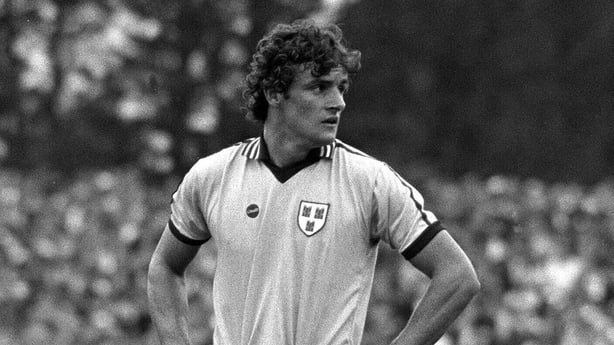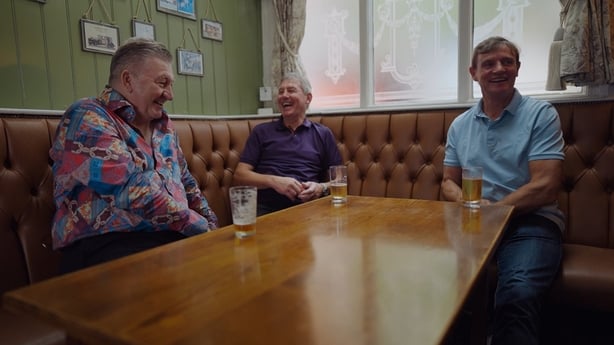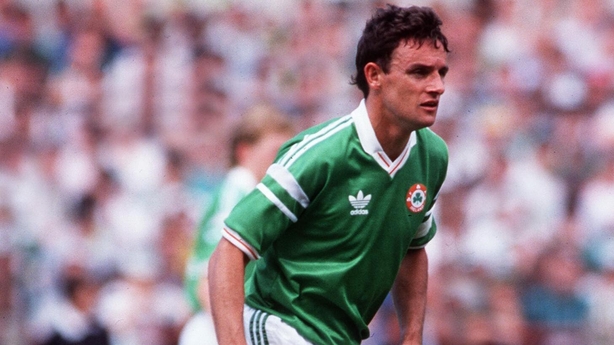It's the soft-spoken, unassuming nature of Kevin Moran that initially catches you off-guard.
Listening to the former Dublin, Manchester United and Republic of Ireland player talk, you can easily forget that this is the same hard-tackling, fiercely competitive player who, over the course of just two seasons at Old Trafford, required 52 stitches in his head.
Rarely included on the lists of greatest Irish sportspeople, Moran enjoyed the kind of sporting career that now only seems possible in comics and fiction.
In a world where the likes of Conor McGregor can preen, shout, insult and brawl their way into the public consciousness and insist that they’re the best in the world, Moran’s quiet humility is refreshing.
It’s not that Moran has little to boast about, it’s more that he’s rather let his achievements speak for themselves.
Watching him speak and recall stories in the new documentary Kevin Moran: Codebreaker – RTÉ One on Monday at 9.35pm – the Dubliner displays a disarming level of humbleness that seen him coast under the radar, occasionally to his benefit.
There’s a striking scene in the documentary where Moran and United greats Bryan Robson and Norman Whiteside reminisce over a beer. As the conservation flows Moran’s former team-mates are trying to work out how he got away with so much in the way of extra-curricular activity while at United when they didn’t.
"Can you understand how he never got a mention?" Robson asks Whiteside. "He got away with murder," Whiteside replies. "It was always me, you and McGrath who got into trouble and he was with us every time," Robson adds.
Moran’s explanation is typically self-effacing. "You only talk about the three great players, you don’t mention anyone else," he laughs.

It's a subtle glimpse into the mindset that made Moran a man who reached the pinnacle of achievement across two codes and perhaps a reason why he’s held in such high regard by anyone who shared a pitch with him.
Former Dublin football team-mates Jimmy Keaveney, Tony Hanahoe and Sean Doherty are effusive in their praise of the man who joined the Dublin set-up as a youngster and made an immediate impact as an aggressive and explosively attacking centre-back.
"Gaelic football was very comfortable to me," Moran explains. "If I had the ball in my hands, no-one was going to get it from me. I was never out of control, I was always in control."
Moran burst into the Irish consciousness in the 1976 All-Ireland final as the youngest member of the Dublin team as they got the better of Kerry, with Moran playing a starring role.
The Dubs repeated the trick the following year, beating Kerry in a colossal semi-final before seeing off Armagh in the final, giving Moran his second All-Ireland winners medal at the age of 21.
All the while there was interest in Moran coming from across the water. He’d rebuffed Manchester United while studying accountancy at UCD but with his studies complete, he decided to go over for a three-day trial at Old Trafford, with a two-and-a-half year contract put under his nose almost immediately.
It took a while for Moran to settle in. He’d gone from playing in front of a full house Croke Park to training with the United reserves and living in digs, but there were advantages to being a relative unknown at such a huge club, as he continued to line out for Dublin, not always with United’s knowledge.

With no social media at the time and the Evening Herald not being a big seller in Manchester, Moran was able to line out for the Dubs in the 1978 Leinster semi-final and subsequent final before eventually asking United for permission to play in the All-Ireland final.
The request was granted, but when he came back to Old Trafford injured, that put an end to his dual-code exploits.
Moran eventually made his senior United debut the following year and survived a cull of the playing staff when Ron Atkinson took charge and went on to cement his place in the first team, winning over the manager and the Old Trafford faithful as a hard-tackling, brave centre back.
As professional Mancunian and Stone Roses base player Mani tells it: "Kevin Moran was a guy who would throw himself in front of a grenade for United. Once he pulled that red jersey on and went over the white line, he’d lay his life down.
Two FA Cup winners medals followed, the second despite him becoming the first player to be sent-off in a final, but when Alex Ferguson replaced Moran in 1986, the writing was on the wall for the defender.
Moran’s height and age – he was under 6ft and the wrong side of 30 - went against him, or so Ferguson said at the time, but the United boss replaced him with the 5ft11" 31-year-old Mal Donachy. Not exactly a young giant.
Spain beckoned for Moran who joined Sporting de Gijon, a move he described as "the best thing I’ve ever done. Spain was a huge resurgence in my career to become a better player".

Jack Charlton’s Republic of Ireland side were one of the main beneficiaries of that move as Moran underwent a renaissance during his time in Spain. He helped the Boys in Green qualify for Euro 88 and the 1990 World Cup, forming a hugely successful defensive partnership with Paul McGrath and Mick McCarthy.
Most Irish youngsters dream of winning an All-Ireland, playing for a top flight club, or lining out for Ireland in the World Cup finals.
Kevin Moran achieved all three and Codebreaker is a fine telling of his story.
'Quite simply the Kevin Moran story is arguably the most extraordinary story in Irish sport' - watch 'Kevin Moran: Codebreaker' on @RTEOne and the @RTEplayer from 9.35pm on Monday 29 May #rtesoccer #rtesport pic.twitter.com/xV8iFwMlin
— RTÉ Soccer (@RTEsoccer) May 26, 2023


